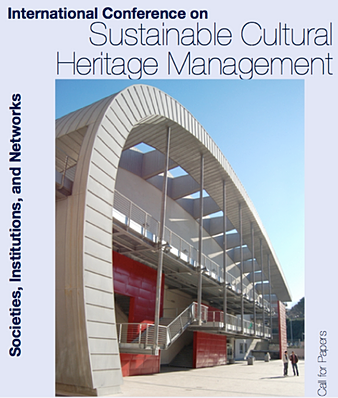International Conference on Sustainable Cultural Heritage Management

Beggining of the course "Cultural Heritage and Future"
This evening will start the "Cultural Heritage and Future" course which encompasses three short seminaries of 12 hours each. Lectures will be framed in the current economic and social reality that determines the new approaches to work, study and research about Cultural Heritage.
More information in the attached document.
Course "Cultural Heritage and Future"
The Cultural Heritage (CH) has experienced a boom in the last decade: investments were made, directly related to infrastructure, training programs have been opened and professional training projects have been funded ... But now, in times of crisis, maintenance is threatened and continuity. Become aware of where we stand today and where we can orient ourselves, is a necessary exercise that they have to make all stakeholders together, from their own disciplines and professional orientations.
Erasmus Mundus Master of Cultural Landscapes
 MaCLand is the acronym for the Master of cultural landscapes, an Erasmus Mundus training initiative carried out by the the Université de Saint-Etienne (FR), the Università degli Studi di Napoli Federico II (IT) and the Instituto Politécnico de Tomar (PT).
MaCLand is the acronym for the Master of cultural landscapes, an Erasmus Mundus training initiative carried out by the the Université de Saint-Etienne (FR), the Università degli Studi di Napoli Federico II (IT) and the Instituto Politécnico de Tomar (PT).
CONCEPTUAL MODELING COURSE FOR CULTURAL HERITAGE 2013
CONCEPTUAL MODELING COURSE FOR CULTURAL HERITAGE 2013
Information management in Cultural Heritage requires that, sometimes, people without computer skills have to design data structures, chips and other systems of information management. This course aims to introduce these people to conceptual modeling and prepare them to perform tasks such as:
Decide what types should be documented
Determine how to describe each kind
Specify how things relate to each other
ERASMUS Intensive Programme HERICT 2013. ICT at the Service of Cultural Heritage
This year, and hopefully in 2014 and 2015, there will be an ERASMUS Intensive Programme under the title HERICT: ICT at the Service of Cultural Heritage. The aim of this project is to enhance the ICT knowledge of cultural heritage experts, in particular archaeology, architecture and geomatics students. The practical training will take place in the site of Kymisala (SW Rhodes). Among the learning outcomes:
Joint Research Center for Digital Humanities and Future Cities
Opening of the Joint Research Center for Digital Humanities and Future Cities in Venice, the result of a collaboration project between two prestigious institutions, Ca’ Foscari University of Venice and Ecole Polytechnique Fédérale de Lausanne, linking computer science and the humanities, and in collaboration with Telecom Italia which will make its technological and service know-how available for specific research and development projects.
Conservation of Geomaterials used on Cultural Heritage (3rd edition CSIC postgraduate course)
The Cultural Heritage covers many aspects and its analysis can be approached from many different points of view, one of which is the study of the materials that have been used on cultural goods.
These materials can be included in the term of geomaterials, defined as those geological materials that following a process are used in various industries, specifically in the configuration and conservation of Cultural Heritage .




